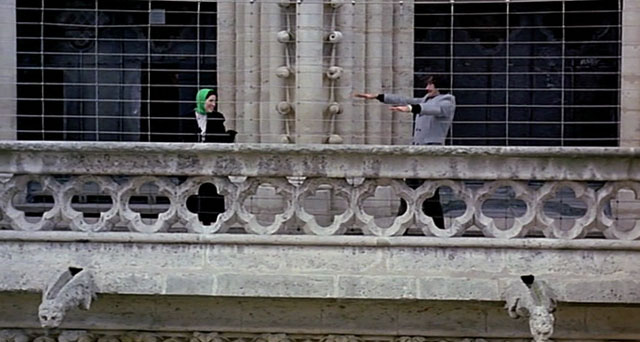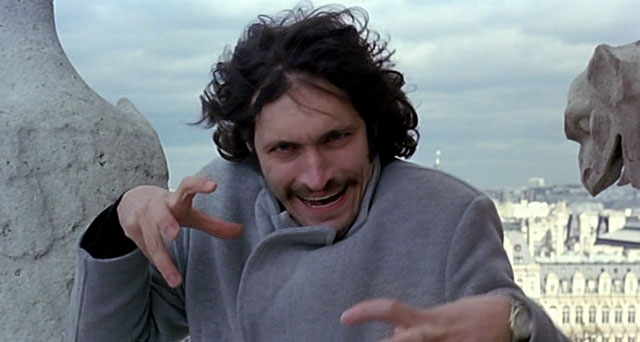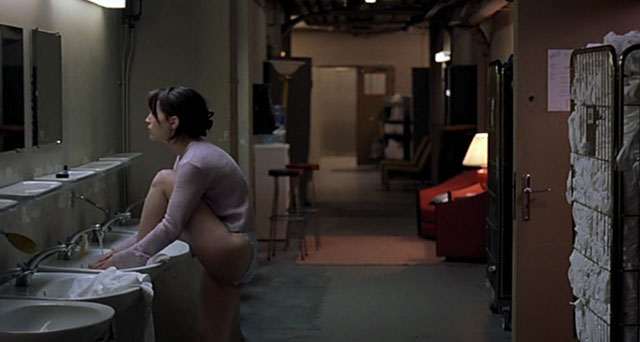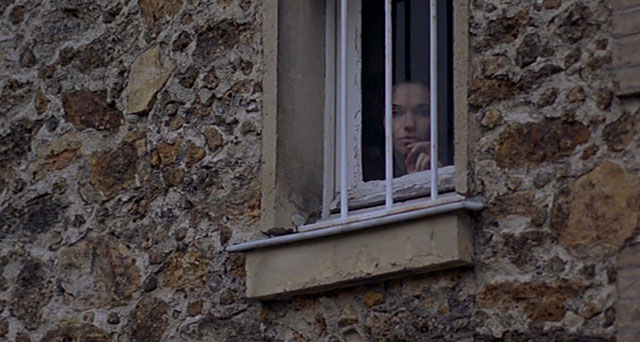Vincent Gallo is on a plane to Paris with his lovely new bride June (Tricia Vessey, the girl who witnesses a hit in Ghost Dog), but he has dark dreams of blood.

Leo (Alex Descas of Irma Vep and plenty of Claire Denis movies) is cleaning up a dead body left by his wife Coré (Béatrice Dalle, Isaach De Bankolé’s blind passenger in Night On Earth).

Turns out Vincent and his ex-lover Coré are vampire/cannibals, and Vince is in town looking for Leo, a doctor who was working on a cure. It’s not much a honeymoon for June, nor much of a marriage for Leo – the vampires feel strong lustful urges, but always resulting in the death of their sexual partner, so June stays frustrated, Leo works in his labs, Coré sucks dry a kid who breaks into her house and Vincent rapes/eats the maid beneath his hotel.

That’s already an unusually juicy plot for a vampire flick, but this is also no vampire flick, it’s a Euro-Art-Film with long wordless sections and gorgeous images, my favorite Claire Denis movie so far.

Surprisingly, the day after I watched this it was notcoming.com’s horror movie of the day. They say:
Claire Denis seems at once unlikely and ideal as the director for a horror film. On the one hand, she seems incapable of making a purely genre film; on the other, no film director in the world more gracefully explores the physical, more pointedly employs cinema to trace the ambiguities of body, persona, and landscape. In this way, a vampire film, with its themes of metamorphosis and the alien nature of appetites is perfectly suited to her abilities as a filmmaker, even if she is unlikely to satisfy our own appetites for genre pleasure. … There are few genre signifiers to reassure us of the presence of that strong moral center so (paradoxically) common to horror films, and the narration of events is characteristically obtuse, reliant on gesture rather than dialogue. …
The metaphor is not finally about a vampire’s exertion of will or power over his victim, but more about the inadvertent draining that happens in a relationship. Shane fears that he will hurt June, that he will tear her apart, that his sexual desire will destroy his wife. It is a metaphor for intimacy and its dangers…
Gallo acts like Frankenstein for his wife’s amusement:


And a few days later the movie was the subject of a discussion on The House Next Door. It is unbelievably long and I haven’t read the whole thing yet… excerpts:
JB:
If I’m properly connecting the film’s vague dots (and I might not be), Coré and Shane are essentially infected. They are diseased. Without this infection, they wouldn’t have these perverse needs and thus wouldn’t act this way, and without the mysterious drug that caused this whole mess they wouldn’t be infected. As a result, I don’t look at Coré and Shane as portals to our dormant demons. I see nothing that reflects my own soul. What I do see in Trouble Every Day is a chilling portrait of addiction. Coré and Shane aren’t addicted to the drug that made them want blood but to the blood itself. Same difference. Now infected, they want to do nothing but “use.” Coré’s husband looks out for her, tries to protect her from herself, hopes to cure her and over and over again gets stuck cleaning up her messes. Shane, meanwhile, sleepwalks through his daily life, unable to connect with anyone outside of his addiction. If I wanted to pick a film that would exemplify the disease model for addiction, it would be hard to do better than Trouble Every Day, which shows how chemical imbalances in the brain obliterate normal rational thought so that ethics are meaningless.

EH:
Scenes like this make the film at least partly about the damaging cycle of an unhealthy love affair, about a man who knows he’s no good for the woman he loves but keeps trying to convince himself that he’s going to do better, that he’s not going to hurt her anymore. But we always hurt the ones we love, right? In some ways the film is about an abusive and often absent spouse, perhaps in contrast to the perverse loyalty of the marriage between Coré and Léo (Alex Descas). We feel June’s confusion and pain when she waits out in the rain, desperate for some sign of her missing man, or when she goes to visit one of his old friends, hoping for some explanation for his inconstant behavior but getting only nostalgia and vague comforting words.

So we can agree that the movie is about lots of things, but not necessarily that it’s a horror film. I, for one, think it’s a definite horror film, and the only reason I can think for anyone to feel otherwise is that it towers above the kinds of movies that “horror” usually brings to mind (see my upcoming writeup on the Puppet Master series for an example). I’m glad that among the direct-to-video Clive Barker junk, I stumbled across two modern horror masterpieces (see also: Pontypool) this SHOCKtober.